(Web version in English)
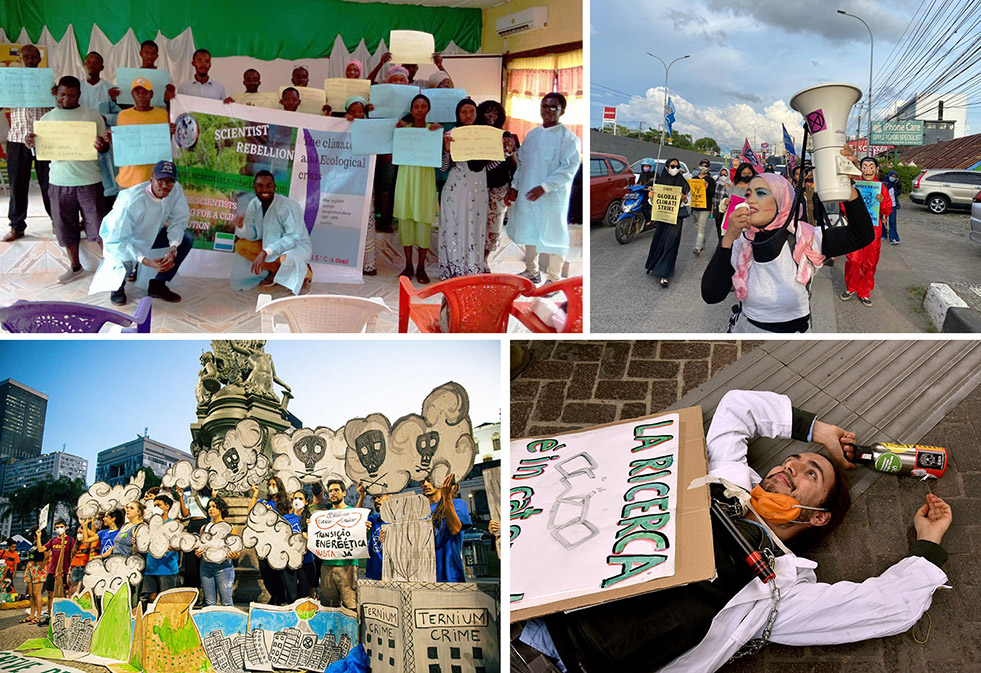 Rebels all over the world take part in global rebellions, including in Sierra Leone, Indonesia, Brazil and Italy.
Rebels all over the world take part in global rebellions, including in Sierra Leone, Indonesia, Brazil and Italy.
In this issue: Global Scientist Rebellion | World Water Rebellion | Just Stop Oil UK |
Dear rebel,
Sometimes there is so much going on in our movement, trying to cover it all in one global newsletter can feel overwhelming. Right now is definitely one of those times.
In the last month, XR groups have organised two Global Rebellions that have brought together thousands of rebels in hundreds of actions across more than 35 countries.
The Global Scientist Rebellion and the World Water Rebellion represent amazing feats of rebel bravery, creativity, and coordination. Both feature an unprecedented balance of actions across the Global North and Global South, with every continent of this planet represented. You can read all about them in Action Highlights.
 Scientists participate in the Global Scientist Rebellion in (top left to bottom right) Rwanda, Washington DC, Switzerland, and Italy.
Scientists participate in the Global Scientist Rebellion in (top left to bottom right) Rwanda, Washington DC, Switzerland, and Italy.
If that wasn’t enough, we also have a report on a rebel campaign targeting UK oil infrastructure in the run up to XRUK’s April Rebellion. Rebels have teamed up with activists from Just Stop Oil to repeatedly disrupt multiple oil refineries.
This exciting campaign demonstrates an escalation of tactics by rebels, and embodies XRUK’s new demand for their rebellion: that the government stop all further fossil fuel licensing and production.
This explosion in global rebellion, together with new alliances and new levels of disruption in the place where rebellions began, shows a heartening evolution of our movement. But it also shows an increasing desperation at the stagnation in our geopolitics.
 For World Water Rebellion, rebels toast the water management company in Rosario, Argentina, which ignores sewage pollution. Their banners: “We're up to here in shit”.
For World Water Rebellion, rebels toast the water management company in Rosario, Argentina, which ignores sewage pollution. Their banners: “We're up to here in shit”.
This month saw the release of the third and final IPCC report, its focus on ways to reduce emissions. Fearing that governments would waterdown its findings to continue business as usual, Scientist Rebellion leaked an early version last summer. Tragically, their fears have proven to be correct.
Despite the most pressing, well-informed, and dire warnings, despite countless protests all over the globe and scientists being arrested enmasse, our leaders still seem unable to put anything or anyone before Big Oil and capitalism.
So the Rebellions must go on, and they must grow even bigger and bolder and more beautiful than they are today. Rest assured, this newsletter team will take some deep breaths, and then keep reporting on the very best of it.
The XR Global Newsletter is brought to you by XR Global Support, a worldwide network of rebels who help XR chapters grow. Read back issues here. Subscribe here.
We are in a crucial phase of human history, and we need money to make our message heard. Anything you can give is appreciated.
Contents
-
Action Highlights - Global Scientist Rebellion, World Water Rebellion, Just Stop Oil UK Pre-Rebellion.
-
World Water Day Roundup - Indonesia, South Africa, DRC, Nigeria, Germany, Serbia, Colombia.
-
Newsletter XTRA - Sweden, Ukraine, Czech Republic, Brazil, Israel, Belgium, USA, France, Norway, Canada, Hungary, Australia…
-
Announcements - Earth Defenders Seminar, XR Art Open Call, XR Podcast.
-
Book Of The Month - The Overstory, by Richard Powers.
Action Highlights
Global Scientist Rebellion: An Embarrassment Of Riches
4 - 9 APRIL | Worldwide
 Rebel scientists pour fake blood over the Spanish parliament in Madrid. It led to the largest simultaneous arrest of scientists ever recorded.
Rebel scientists pour fake blood over the Spanish parliament in Madrid. It led to the largest simultaneous arrest of scientists ever recorded.
Scientist Rebellion has launched another week of global civil disobedience, and it proved to be the largest protest by scientists in history. Over 1000 of them took part in actions across more than 28 different countries, and that was just on one day!
Organisers described the campaign as an “embarrassment of riches” with too many actions and rebel scientist contributions to count. What was particularly exciting was the geographical range of the rebellion, with scientists from across Africa and South America joining their Global North colleagues to declare 1.5°C dead, and demand a climate revolution!
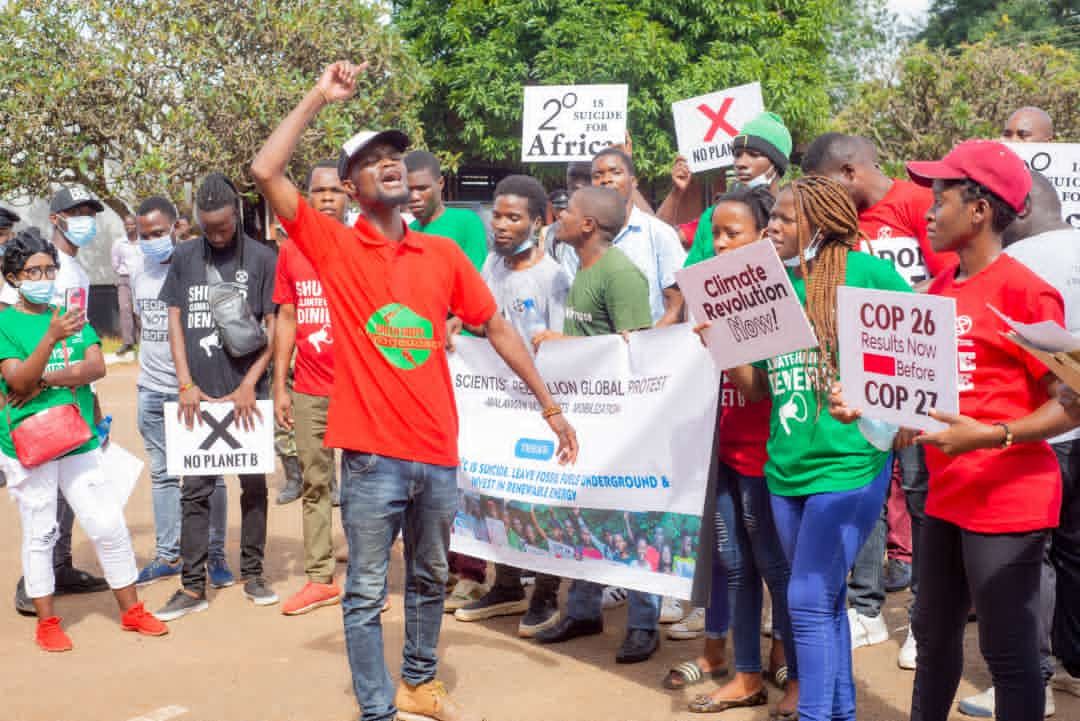 In Malawi, following a teach-in at Lilongwe University, a letter was delivered to the nation’s president demanding a scientific approach to climate policy.
In Malawi, following a teach-in at Lilongwe University, a letter was delivered to the nation’s president demanding a scientific approach to climate policy.
Scientists threw fake oil over the Shell HQ in London, chained themselves to the White House in Washington DC, pasted scientific papers onto the Ministry of Transport in Berlin, rallied in front of the Ecuadorian Ministry for the Environment in Quito, held teach-ins in Sierra Leone, and marched through the streets of Uganda and the campuses of Nigeria.
These disruptive actions led to numerous arrests, including a NASA scientist who chained himself to a Chase Bank in Los Angeles, a 77 year old professor who blocked a highway in Sydney, and the 53 scientists who threw fake blood onto the National Congress building in Madrid, which is likely to be the most scientists ever arrested simultaneously during a protest.
 Ecuadorian rebel scientists pasted articles and held a rally outside the Ministry of the Environment in Quito.
Ecuadorian rebel scientists pasted articles and held a rally outside the Ministry of the Environment in Quito.
Scientist Rebellion was founded in 2020 when two physicists threw paint over the Royal Society in London, the oldest scientific institution in the world, and called on scientists to engage in civil disobedience. As this rebellion has made clear, it has grown into a powerful international movement over the last two years.
If you want to join Scientist Rebellion or learn more about the group, visit their website and check out their Youtube channel.
World Water Rebellion: Africa & South America Rise Up!
20 - 25 MARCH | Worldwide
 XR Iganga holds a rally at a local borehole to highlight Uganda’s increasingly limited sources of clean water.
XR Iganga holds a rally at a local borehole to highlight Uganda’s increasingly limited sources of clean water.
XR groups around the world staged a week of water-themed protests to coincide with World Water Day and The World Water Forum, a major summit that brings together governments, businesses, NGOs and other organisations to increase access to clean water and sanitation.
Today, water scarcity affects around 40% of the world's population and, according to the UN and World Bank, droughts could displace 700 million people by 2030.
The Word Water Forum took place in the Sénégalese capital Dakar, and XR Sénégal invited rebels across Africa to join them there and take part in actions throughout the week-long summit.
 Speakers from XR Senegal and XR DRC debate Africa’s water security (top). Rebels from Senegal, Gambia, Uganda, South Africa and Rwanda outside the World Water Forum (below).
Speakers from XR Senegal and XR DRC debate Africa’s water security (top). Rebels from Senegal, Gambia, Uganda, South Africa and Rwanda outside the World Water Forum (below).
Together, they organised a citizens' assembly, spoke to locals struggling with water scarcity, and held a street protest demanding access to water for all. They also called out the World Water Forum for making empty promises, and prioritising the needs of corporations over local people in their efforts to find solutions.
One rebel spoke about the situation in Kinshasa-Congo where children regularly die of waterborne diseases, and many people lack access to drinking water, despite having received millions of dollars to improve the situation from the World Bank. He demanded that African leaders be assessed first before being given more funds.
XR Cameroon teamed up with ‘Green and Better World’ to educate students in Limbe about an ongoing cholera outbreak. The water-borne disease (long eradicated in the West) is leading many in the country to hospitalisation and death.
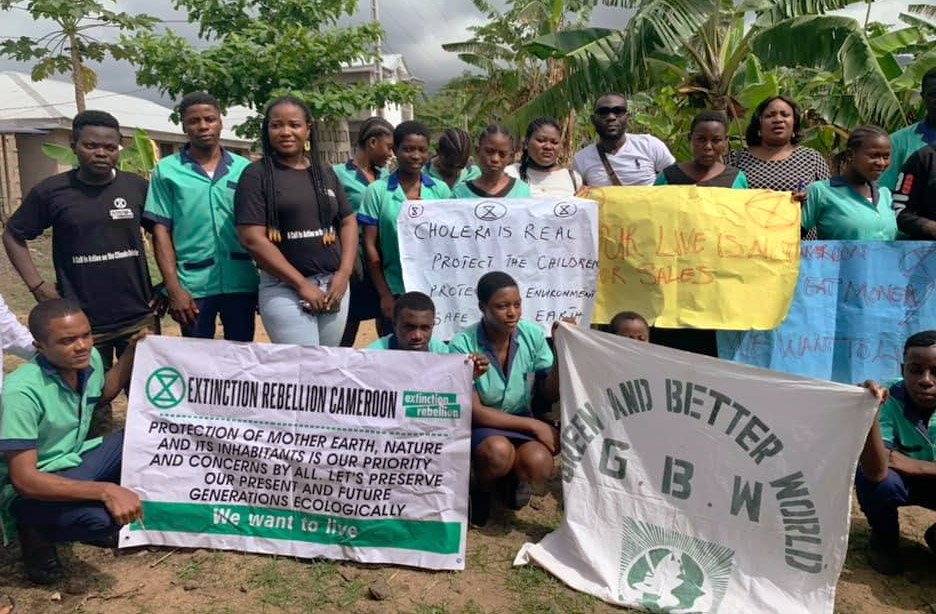 XR Cameroon with students at a school in Limbe during a teach-in about the country’s ongoing cholera outbreak.
XR Cameroon with students at a school in Limbe during a teach-in about the country’s ongoing cholera outbreak.
Ugandan group XR Iganga highlighted water scarcity with rallies at regional water wells. Many locals use polluted water because clean sources are too far away, and they cannot afford to buy commercial water. Many wells also dry up in summer, a problem exacerbated by the region’s rising temperatures.
In Johannesburg, rebels protested outside the head office of a coal mining company which recently caused an acid mine spill, while in Cape Town they held a celebratory ceremony in the Liesbeek River after the indigenous San and Khoi peoples won a court case stopping the corporation Amazon from building on the river’s floodplain.
 Dehydrated rebels in Mar Del Plata, Argentina, nearly ‘die’ of thirst (top). Meanwhile piranhas in Buenos Aires try to devour the fence of the Government House.
Dehydrated rebels in Mar Del Plata, Argentina, nearly ‘die’ of thirst (top). Meanwhile piranhas in Buenos Aires try to devour the fence of the Government House.
Under the banner ‘Aguas en Rebedía’ (Waters in Rebellion) actions were also launched by rebels across South America, a region where water has been privatised and polluted by global corporations to a staggering degree.
In Mexico, rebels denounced the theft of community wells by water company Bonafont, and the eviction of indigenous activists who reclaimed one of their water bottling plants.
Argentinian rebels became a shoal of piranhas as they protested the lethal cocktail of agrochemical contamination, sewage spillage, and global heating that is polluting their waterways and causing them to run at historic low levels.
 Rebels in Lima, Peru protest against the Ariana mining project which threatens the city’s water supply.
Rebels in Lima, Peru protest against the Ariana mining project which threatens the city’s water supply.
Peruvian rebels demanded action by Repsol for the devastating oil spill still plaguing its coastline. They also denounced the Ariana mining project, which threatens to contaminate Lima’s main source of water, which is used by more than 10 million people.
For more details on this explosion of activism across Latin America watch this short round-up video. For a compilation of the best actions from around the world check out this World Water Rebellion livestream.
Just Stop Oil & XR Unite For Pre-Rebellion
1 - ? APRIL | UK
Rebels have allied with activists from the new group Just Stop Oil (JSO) to blockade oil facilities across the UK. The series of actions were launched in the week before a nationwide April Rebellion, and demonstrate the new demand that XRUK and JSO are making to their government: halt all new fossil fuel licensing and production.
XRUK and JSO have repeatedly disrupted more than ten oil facilities, blocking entrances, locking-on to structures, hiding in secretly constructed tunnels, and clambering atop oil trucks.
 Rebels (top) and JSO activists (below) start blockading oil terminals on Fossil Fools Day (April 1st).
Rebels (top) and JSO activists (below) start blockading oil terminals on Fossil Fools Day (April 1st).
Directly targeting oil infrastructure represents an escalation of disruptive tactics by our movement. But with the latest instalment of the IPCC report warning that 1.5°C will be out of reach without immediate reduction in fossil fuel use, both XRUK and JSO have pledged to continue targeting the industry until the government agrees to stop the 40 new oil and gas licences that are planned before 2030, and ends the fossil fuel economy as a whole.
JSO was mobilised by the Youth Climate Swarm, a collection of non-violent activists for people aged up to 30, meaning the group is youth-led. A JSO supporter says: “it’s really important that youth are at the forefront, because we are the ones who are going to suffer if these oil licences do get signed.”
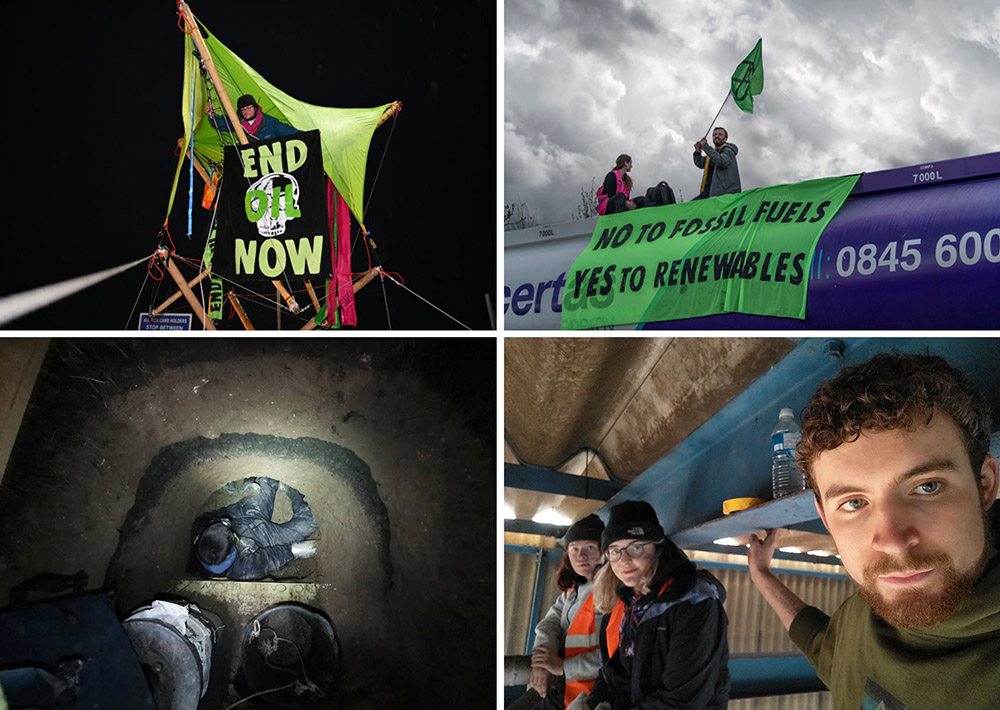 While rebels scaled bamboo tripods and oil tankers (top), JSO activists scuttled down secret tunnels and locked themselves to oil pipes and roof rafters (below).
While rebels scaled bamboo tripods and oil tankers (top), JSO activists scuttled down secret tunnels and locked themselves to oil pipes and roof rafters (below).
Many of JSO’s activists have links to XR and Insulate Britain, but this is the first time that the groups have united. While XR’s tenets lie in civil disobedience, JSO has defined their strategy as civil resistance.
Our JSO supporter describes civil resistance as a shift from asking the government for action, to making demands happen through direct action: “I’ve been part of many campaigns that ask things of the government – and we’re still doing that now, but we’re also using our bodies to actively stop oil. We can’t wait around for the government to act.”
A key action targeted the Navigator oil terminal, a distribution centre responsible for about 50% of vehicle fuels in the southeast of England. Using a technique called “tanker surfing,” rebels sat on oil tankers that transport fuel across the country day and night. Rebels have also locked on to pipes and refinery structures.
 JSO’s Australian branch (Just Stop It) were simultaneously blockading the Exxon Mobil terminal in Yarraville (top) and Exxon Mobil’s Melbourne HQ (below). Top photos: Matt Hrkac. For news of JSO’s Norwegian branch check out Newsletter XTRA.
JSO’s Australian branch (Just Stop It) were simultaneously blockading the Exxon Mobil terminal in Yarraville (top) and Exxon Mobil’s Melbourne HQ (below). Top photos: Matt Hrkac. For news of JSO’s Norwegian branch check out Newsletter XTRA.
The Navigator terminal was successfully blocked for 36 hours, with the first rebel only removed after 12 hours. In the following days, police presence escalated, with a national response bringing hundreds of officers to oil terminals across the country.
Ten days into the campaign, JSO reported 800 arrests. Despite this, the government has not responded, and mainstream media has failed to make clear the link between the actions and rising fuel shortages in the region.
As the April Rebellion launches, disruption to the UK’s oil and gas economy will continue. Be sure to check out the full report next issue, and learn more about JSO by visiting their website and following them on social media.
World Water Day Roundup
 22 MARCH | Makassar, Indonesia Rebels blockade a major city road to protest against the privatisation of water.
22 MARCH | Makassar, Indonesia Rebels blockade a major city road to protest against the privatisation of water.
 22 MARCH | Johannesburg, South Africa Activists do the water salute during a protest outside a local coal mining company’s headquarters.
22 MARCH | Johannesburg, South Africa Activists do the water salute during a protest outside a local coal mining company’s headquarters.
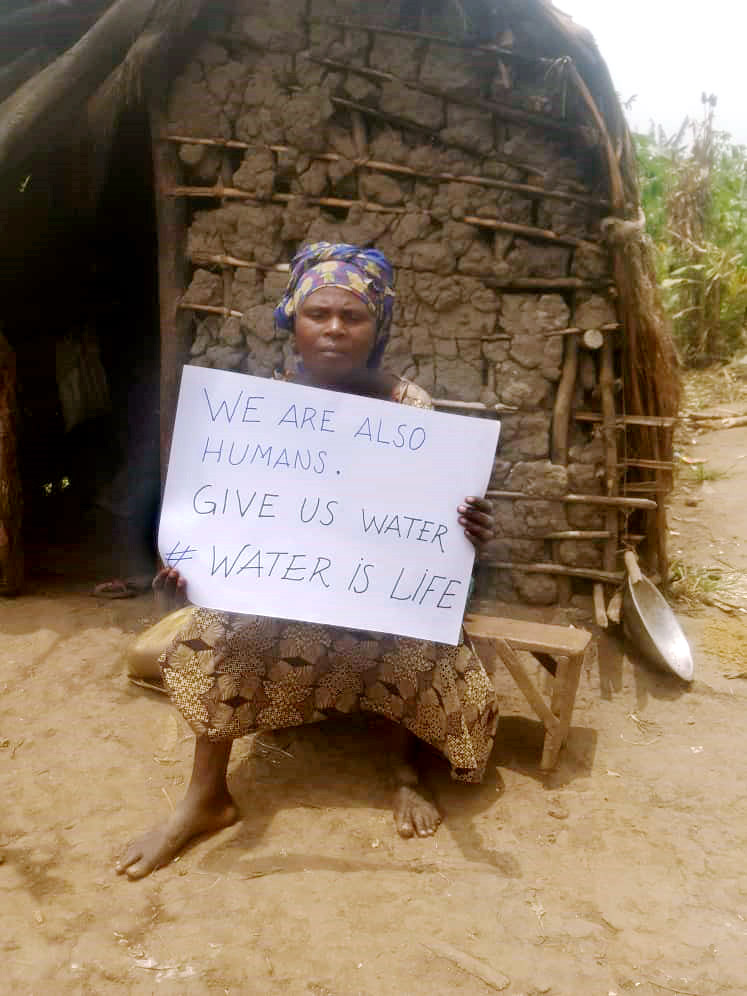 22 MARCH | Rutshuru, DRC XR Rutshuru mobilised in a makeshift camp for 1,000 displaced people in eastern DRC, where access to drinking water is a major issue. They called on the state as well as the international community to take urgent measures.
22 MARCH | Rutshuru, DRC XR Rutshuru mobilised in a makeshift camp for 1,000 displaced people in eastern DRC, where access to drinking water is a major issue. They called on the state as well as the international community to take urgent measures.
 22 MARCH | Jigawa, Nigeria XR Muslims organised a water awareness event at a school in North West Nigeria, where groundwater is the only source of water.
22 MARCH | Jigawa, Nigeria XR Muslims organised a water awareness event at a school in North West Nigeria, where groundwater is the only source of water.
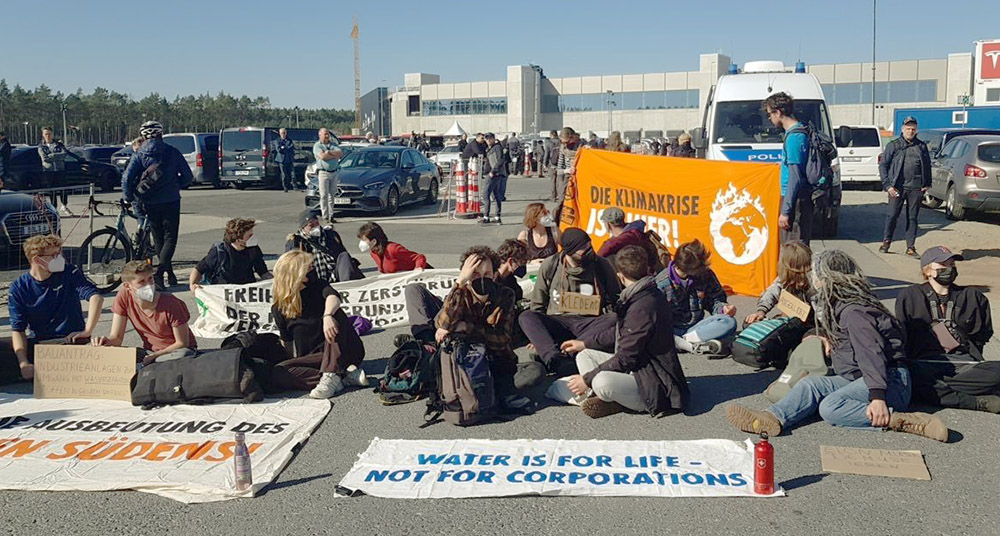 22 MARCH | Berlin, Germany XR Germany blockaded the new Tesla Gigafactory for electric cars because of its vast water consumption in a drinking water protection area.
22 MARCH | Berlin, Germany XR Germany blockaded the new Tesla Gigafactory for electric cars because of its vast water consumption in a drinking water protection area.
 22 MARCH | Belgrade, Serbia Rebels publicised the dirty water from the city of Zrenjaninska, denouncing how it hasn’t had drinkable water for 18 years. This fate that could await other Serbians if several construction projects go ahead in the region, most notably the Rio Tinto mines in Loznica that we reported on in a past issue.
22 MARCH | Belgrade, Serbia Rebels publicised the dirty water from the city of Zrenjaninska, denouncing how it hasn’t had drinkable water for 18 years. This fate that could await other Serbians if several construction projects go ahead in the region, most notably the Rio Tinto mines in Loznica that we reported on in a past issue.
 22 MARCH | Santander, Colombia Young activists say no to fracking. A pilot fracking project will soon start, despite widespread protest. The Magdalena river, the livelihoods of millions, and the lives of activists who speak out are at risk.
22 MARCH | Santander, Colombia Young activists say no to fracking. A pilot fracking project will soon start, despite widespread protest. The Magdalena river, the livelihoods of millions, and the lives of activists who speak out are at risk.
So many rebel actions happened this month we couldn’t fit them into five newsletters, let alone one! Head over to Newsletter XTRA to find out about actions in Ukraine, Sweden, Czech Republic, Israel, Canada, Hungary, France & more. Newsletter XTRA: A feast for the eyes and extra fuel for the soul!
Announcements
We are Extinction Rebellion: Earth Defenders Edition
21 APRIL | 16:00 UTC | Facebook

Join us in conversation with XR Earth Defenders from Brazil, Rwanda, Ecuador, Colombia and South Africa.
Hear stories from the front line of the ecological crisis and learn how XR Global Support has helped in their fight for action and justice.
Tune in on Facebook for this Earth Day celebration, and put a human face to a systemic crisis.
XR Art: Open Call for Artists & Creatives
Submission Deadline 20 MAY | Worldwide

In 2021 an international art project was born in Milan that aimed to communicate the seriousness of the eco-climatic crisis in an innovative, incisive and irreverent way.
The next edition of this project is to create a global event with contemporary exhibitions in different cities. The format will be open source: works can be selected, downloaded and printed by anyone who wants to organise an exhibition.
Artists can use techniques of their choice to create works that communicate the urgent need for mass awareness, and the severity of the crisis we are going through.
For more information and an application form check out our website or email: [email protected]
XR Podcast: Ukraine, Fossil Fuels, UK Rebellion
Out Now

This podcast episode is all about energy, and features the writer Margaret Atwood connecting the war in Ukraine to the fossil fuel crisis, as well as an interview with energy expert and former BBC environment correspondent Richard Black.
Co-presenter Nuala Lam, a veteran of the XRUK Media and Messaging team, also discusses the strategy behind the upcoming April Rebellion.
Listen to the XR Podcast here.
Book of the Month
The Overstory, by Richard Powers

The Overstory does not, at first, seem like a novel about climate change. We’re not sure it’s even a novel.
But oh, wow!
It starts as seven apparently unrelated stories that then merge into a sprawling tale about radical environmental activism in the 1980’s. Then the stories separate out again and finally the book ends, but with no clear resolution.
This isn't the arc-shaped plot we’ve been taught novels should have. Instead, it’s a tree.
It’s also beautifully-written fiction incredibly dense with scientific and historical fact. That there really were fish living in pools up in redwood canopies, and liquid mace really was dripped in the eyes of locked-down activists, is heart-rending.
The Overstory covers issues closely related to climate change, but there’s another reason we’re recommending it.
Humans easily get so preoccupied with ourselves that we forget how to notice each other, never mind the rest of the world—and we know where that preoccupation leads. But the brilliance of The Overstory is that it denies preoccupation. Its very refusal to play by the rules of normal human discourse, is its refusal to look away from the existence of the more-than-human.
It is an escape hatch from solipsism, a call to unsuicide.
Avoid Amazon. Support local bookshops! Buy your books at Bookshop or Hive.
Thank you
 The April Rebellion in London has already begun. Expect a full report in the next issue. Photo: The Lightscaper
The April Rebellion in London has already begun. Expect a full report in the next issue. Photo: The Lightscaper
Thank you for reading, rebel. If you have any questions or feedback, we want to hear from you. Get in touch at [email protected].
Get involved in XR wherever you are. Check out our global website, learn more about our movement, and connect with rebels in your local area.
We are in a crucial phase of human history, and our movement needs money to make our message heard. Anything you can give is appreciated.